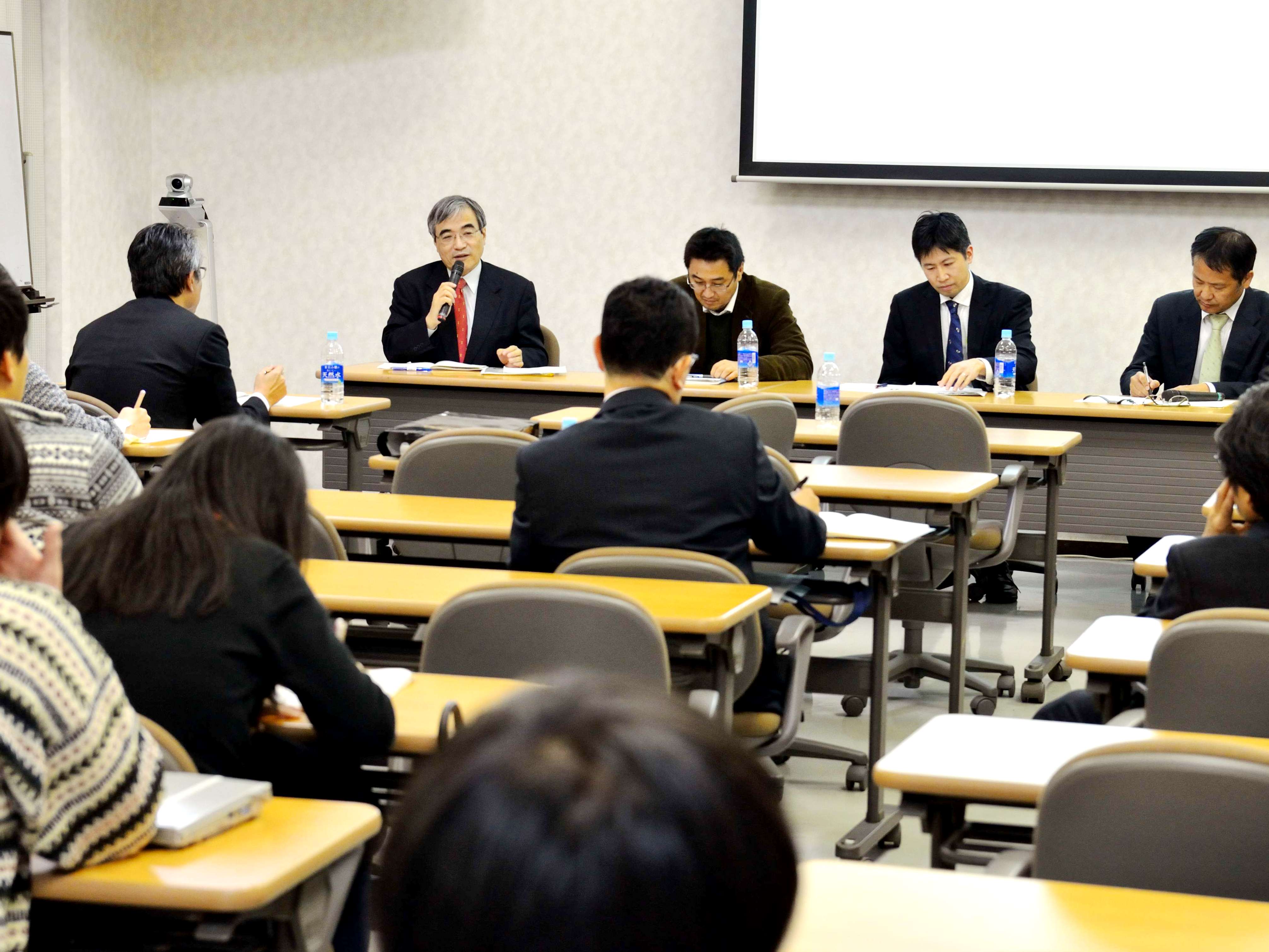JICA and Hiroshima University Co-hosted Seminar on Post MDGs
2013.12.05
On November 18, Hiroshima University Graduate School for International Development and Cooperation and JICA co-hosted a seminar entitled “the Japan Society for International Development - Hiroshima Chapter Seminar: Thinking about the Post-MDGs at Hiroshima University” that assembled participants from universities and the general public in the Kansai area. From JICA, Vice President Hiroshi Kato, Koji Yamada, Senior Advisor to the Director-General of JICA Operation Strategy Department, and JICA-RI Senior Research Fellow Go Shimada attended the seminar.
At the start of the seminar, Professor Akimasa Fujiwara, Dean of the Graduate School for International Development and Cooperation of Hiroshima University, gave the opening remarks.

Subsequently, JICA-RI Director Hiroshi Kato (JICA Vice President) introduced the initiatives and the goals of the post-MDGs research at JICA-RI, expressing the importance of creating the aid trends along with reviewing a history of the MDGs that have developed as an international framework
Yamada explained the international trend in the post-MDGs, tracing back their formation along with introducing the developments, focal points of the current arguments, and the blueprint for the new development goals for post 2015. He pointed out that inclusiveness and resilience are the major issues, particularly in consideration of the new development goals.
Eiji Kozuka, Specially Appointed Associate Professor of Hiroshima University Graduate School for International Development and Cooperation, gave a presentation on the theme of “Inclusive Development and the Post-MDGs.” Defining inclusive development as “development that fosters the welfare of all through equal opportunities,” he explained the differences in the definitions of the World Bank, Asian Development Bank, and African Development Bank. He further noted that education and early childhood development to narrow a rich-poor gap, infrastructure and employment to extend job opportunities are important for the post-MDG agenda. He stressed that in the field of education, the achievement of universal primary education, the development of basic reading, writing, and calculation abilities, support for children with disabilities, and improvements in the access to and quality of lower secondary education are all crucial from the inclusive perspective.
Shimada introduced his research at JICA-RI on the subject of “Resilience, Social Capital, and the Post-MDGs.” He explained that from a perspective of human security, resilience and inclusiveness are key factors to achieve human security, while indicating external shocks such as disasters deteriorate structural vulnerability. About resilience, he said that since disasters cause absolute losses including the death of family members, reconstructing social functions and a new society is crucial. In this connection, he argued that a resilient society can be built with focus on social capital through discussion of the roles that kizuna (social capital) plays in association with social functions such as institutions and markets. Lastly Shimada stressed: “The world should be a place with resilience and no disparities, which ensures human security in the post-MDGs.”
In the following panel discussion moderated by Professor Takuya Baba of Hiroshima University, JICA-RI Director Kato together with Professor Shinji Kaneko and Associate Professor Tatsuo Yamane of Hiroshima University Graduate School for International Development and Cooperation, discussed the theme of the role of universities in the post-MDGs. During the discussion and the Q and A session, the participants debated over what research Japanese universities and research institutions should carry out on these new development issues, what roles they should take on, what functions the post-MDGs should have in order to promote peace, and what will change specifically by the use of new keywords such as “inclusiveness” and “resilience,” and the like.

事業事前評価表(地球規模課題対応国際科学技術協力(SATREPS)).国際協力機構 地球環境部 . 防災第一チーム. 1.案件名.国 名: フィリピン共和国.

事業事前評価表(地球規模課題対応国際科学技術協力(SATREPS)).国際協力機構 地球環境部 . 防災第一チーム. 1.案件名.国 名: フィリピン共和国.

事業事前評価表(地球規模課題対応国際科学技術協力(SATREPS)).国際協力機構 地球環境部 . 防災第一チーム. 1.案件名.国 名: フィリピン共和国.

事業事前評価表(地球規模課題対応国際科学技術協力(SATREPS)).国際協力機構 地球環境部 . 防災第一チーム. 1.案件名.国 名: フィリピン共和国.

事業事前評価表(地球規模課題対応国際科学技術協力(SATREPS)).国際協力機構 地球環境部 . 防災第一チーム. 1.案件名.国 名: フィリピン共和国.
scroll